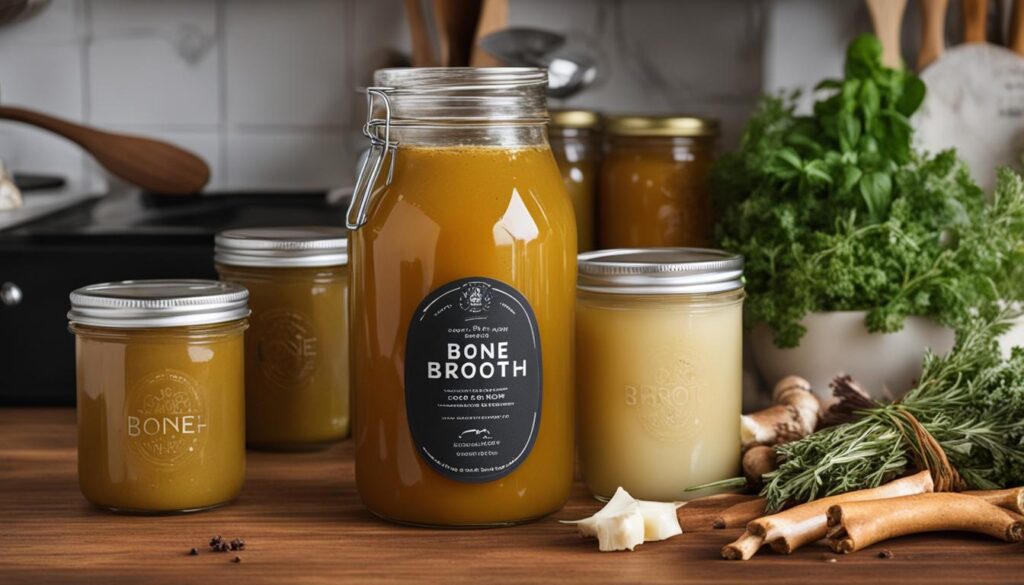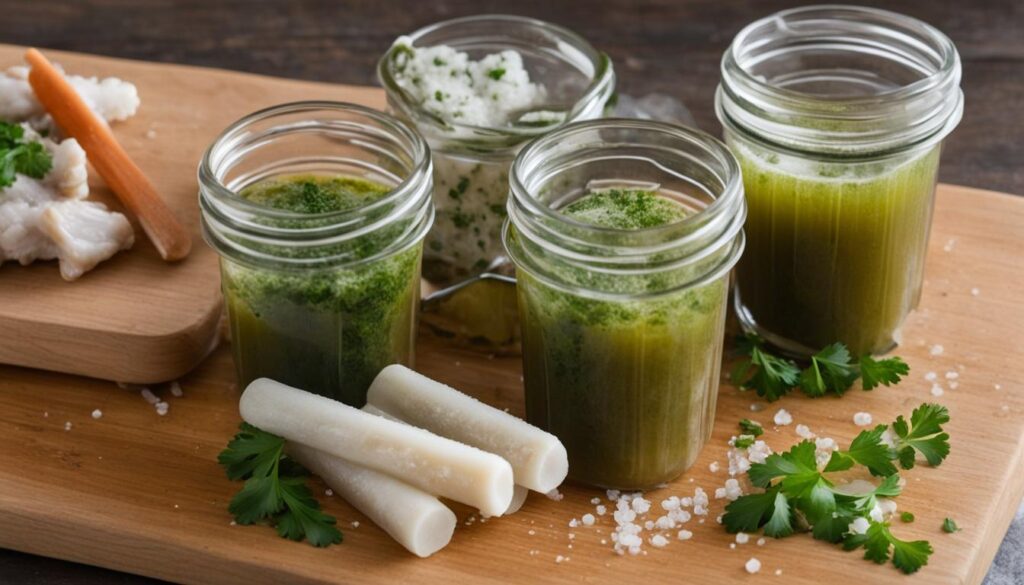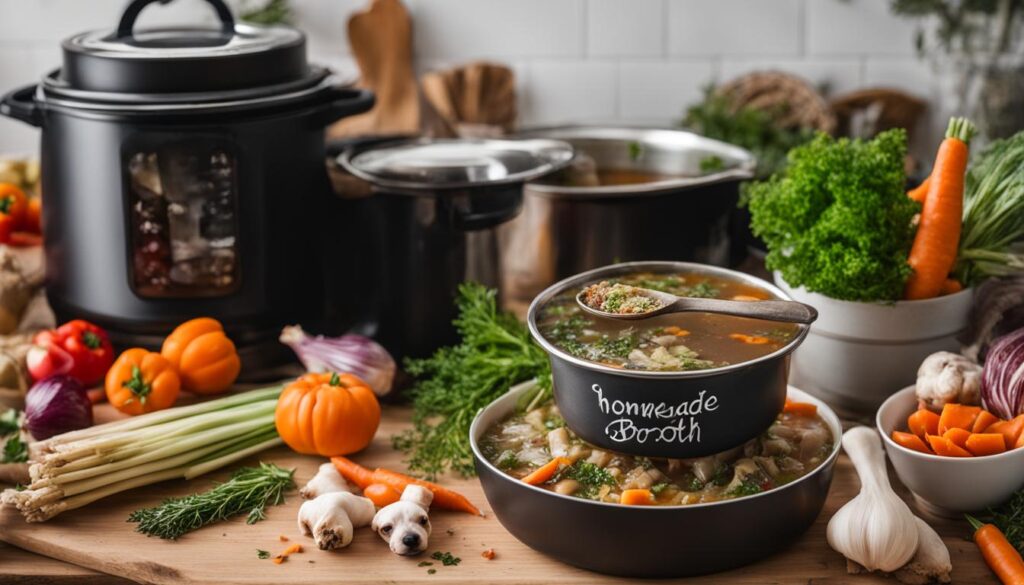Making bone broth for dogs is a simple and nutritious way to support their health. Bone broth helps maintain a healthy gut, supports the immune system, protects joints, and provides essential minerals. By following a step-by-step guide, you can easily make homemade bone broth that your furry friend will love.
When it comes to making bone broth for dogs, the process is quite straightforward. It involves simmering bones, water, and a small amount of vinegar for approximately 24 hours. After straining the broth, you can add optional vegetables for extra nutritive value. Making bone broth at home ensures that you have full control over the ingredients, resulting in a dog-friendly and nutrient-rich bone broth.
Bone broth offers a multitude of benefits for dogs. It strengthens their joints and provides essential minerals, such as calcium and phosphorus, which are vital for their overall health. Additionally, bone broth aids in digestion and provides healing properties for dogs with gut-related issues.
Key Takeaways:
- Homemade bone broth for dogs is a simple and nutritious choice.
- Bone broth supports a healthy gut, immune system, and joint health in dogs.
- Follow a step-by-step guide to make dog-friendly bone broth at home.
- Bone broth provides essential minerals and healing properties for dogs.
- Adding optional vegetables can enhance the nutritional value of the bone broth.
Why Make Bone Broth for Your Dog?

Bone broth offers numerous health benefits for dogs. It helps maintain a healthy gut, supports the immune system, and protects joints. The gelatin in bone broth aids in the repair of leaky gut, which can cause allergies and digestive issues in dogs. Additionally, bone broth is rich in minerals like silicon, sulfur, magnesium, calcium, and phosphorus, which are essential for overall canine health.
Benefits of Bone Broth for Dogs:
- Supports a healthy gut
- Boosts immune system
- Protects joints
- Aids in repairing leaky gut
- Rich in essential minerals
Bone broth offers a natural and nutritious way to enhance your dog’s health. It can help address common digestive issues, strengthen their immune system, and promote joint health. The minerals found in bone broth contribute to the overall well-being of your canine companion.
“Bone broth provides a wide range of health benefits for dogs, from supporting gut health and boosting immunity to protecting their joints.”
Homemade Bone Broth Recipe

Making bone broth at home is a simple and rewarding process that provides your dog with a nourishing and flavorful treat. Follow this step-by-step guide to create a delicious and dog-friendly bone broth recipe.
Ingredients:
- Organic, grass-fed bones (such as chicken feet or marrow bones)
- Water
- Raw apple cider vinegar or lemon juice
- Optional vegetables or herbs for added flavor and nutrients
Instructions:
- Start by gathering high-quality, organic, grass-fed bones. Chicken feet or marrow bones are excellent choices. These can usually be found at your local butcher or grocery store.
- Fill a crockpot or pot with the bones and cover them with water, leaving a few inches of water above the bones.
- Add a small amount of raw apple cider vinegar or lemon juice to the pot. This helps extract the minerals from the bones during the cooking process.
- Cook the broth on high for an hour to allow the bones to release their nutrients. Then, reduce the heat to low and let the broth simmer for 24 hours. This slow and gentle cooking process helps extract all the beneficial compounds from the bones.
- After 24 hours, strain the bones and meat from the broth, ensuring you remove all the solid elements.
- You can enhance the flavor and nutritional value of the bone broth by adding optional vegetables or herbs. Consider using carrots, celery, parsley, or turmeric.
- Before serving the bone broth to your dog, it’s important to remove any excess fat that has formed on the surface. This can be easily done by skimming it off with a spoon or using a fat separator.
Your homemade bone broth is now ready to be served to your dog. Allow it to cool to a safe temperature and add it to your dog’s meals as a beneficial supplement. Ensure any leftovers are stored in the refrigerator in an airtight container for up to one week or frozen for longer use.
Benefits of Bone Broth for Dogs

Bone broth provides numerous benefits for dogs. It is a natural source of essential nutrients and healing properties that promote overall health and well-being.
Joint Health Support
Bone broth is rich in glucosamine and chondroitin sulfate, which are beneficial for maintaining joint health in dogs. These compounds help reduce inflammation and preserve collagen in the joints, promoting mobility and reducing the risk of joint-related issues.
Strengthens Bone and Muscles
The amino acids and proteins present in bone broth contribute to the strength and development of bones and muscles in dogs. Regular consumption of bone broth can help prevent bone-related diseases and improve overall bone density.
Improved Gut Health
Bone broth has healing properties that promote optimal gut health in dogs. It helps reduce irritation in the digestive system and strengthens the intestinal lining, making it beneficial for dogs with sensitive stomachs, allergies, or digestive issues.
Hydration and Digestion
Providing bone broth to dogs helps maintain hydration levels in the body, especially during hot weather or illness. It is also easily digested, making it an ideal addition to the diet of dogs with digestive sensitivities or those recovering from an illness or surgery.
| Benefits of Bone Broth for Dogs |
|---|
| Supports joint health |
| Strengthens bones and muscles |
| Improves gut health |
| Aids in hydration and digestion |
Image:
How to Serve and Store Bone Broth

When it comes to serving and storing bone broth for your dogs, there are a few important considerations to keep in mind. Follow these guidelines to ensure that your furry friend enjoys the benefits of bone broth safely and conveniently.
Serving Size:
When introducing bone broth into your dog’s diet, start with a small amount and gradually increase the serving size over time. This allows their digestive system to adjust and prevents any potential stomach upset. A few spoonfuls added to their regular meals is a good starting point.
Storage:
Proper storage is crucial to maintain the freshness and nutritional value of homemade bone broth. Store the broth in an airtight container and keep it refrigerated. It can stay fresh in the refrigerator for up to one week.
If you have made a large batch or want to store bone broth for an extended period, freezing is a great option. Transfer the cooled broth into ice cube trays or freezer-safe containers. This allows you to thaw and serve smaller portions as needed.
Ensure that the bone broth is completely cool before transferring it to the refrigerator or freezer to avoid condensation build-up and freezer burn.
Thawing and Serving:
When you’re ready to serve the frozen bone broth, thaw it by warming it up to a safe temperature for your dog. You can do this by heating it gently on the stovetop or using a microwave. Make sure it is not too hot before serving it to your furry friend.
Remember, always monitor your dog while they’re consuming bone broth, especially if it’s their first time trying it. Observe for any signs of allergies or adverse reactions and consult with a veterinarian if you have any concerns.
Chicken Bone Broth Pupsicle Recipe

A fun and refreshing way to serve bone broth to dogs is by making pupsicles. These frozen treats provide the same nutritional benefits as warm bone broth and can help dogs cool off during hot weather. Let me share with you a simple recipe for Chicken Bone Broth Pupsicles.
Ingredients:
- Homemade bone broth (chicken)
Instructions:
- Prepare the bone broth as directed in the homemade bone broth recipe mentioned earlier.
- After removing the bones and grinding them, mix them back into the broth for added texture and flavor.
- Pour the bone and broth mixture into a silicone mold. You can use bone-shaped or paw-shaped molds to make it more fun for your furry friend.
- Place the mold in the freezer and let it freeze for several hours, or overnight, until solid.
- Once frozen, remove the pupsicles from the mold and store them in an airtight container in the freezer until ready to serve.
When your dog deserves a special treat, simply give them a chicken bone broth pupsicle. They’ll love the tasty, icy goodness, and you’ll have peace of mind knowing that it’s packed with all the nutritional benefits of bone broth. It’s a win-win!
Tips for Making Bone Broth

When it comes to making bone broth for dogs, there are a few tips and tricks to ensure you create a nutritious and flavorful broth. Follow these tips for making homemade bone broth for dogs and elevate your cooking skills:
Choose High-Quality Bones
Start with high-quality bones, ideally organic and grass-fed options. These bones have a higher nutrient content, providing the best foundation for your bone broth.
Enhance Mineral Extraction
Add a small amount of raw apple cider vinegar or lemon juice to the water when simmering the bones. This helps extract minerals from the bones, resulting in a more nutrient-rich broth.
Simmer for Optimal Time
Simmer the bones for at least 24 hours to ensure the broth is packed with nutrients. This slow cooking process allows the bones to release their collagen, vitamins, and minerals, producing a flavorful broth.
Strain and Discard Bones
After simmering, strain the broth to remove any bone fragments or unwanted debris. It is crucial to discard the bones, as cooked bones can splinter and pose a hazard to your dog’s health.
Remove Fat Layer
Once the broth has cooled, you may notice a layer of fat on the surface. Removing this fat improves the overall quality of the bone broth and makes it healthier for your dog.
| Tips for Making Bone Broth |
|---|
| Choose high-quality bones |
| Enhance mineral extraction with raw apple cider vinegar or lemon juice |
| Simmer the bones for at least 24 hours |
| Strain and discard bones |
| Remove the fat layer from the cooled broth |
By following these tips, you can create a delicious and nutritious bone broth that your dog will love. Remember to use high-quality ingredients, cook the bones for adequate time, and remove any excess fat to ensure the best bone broth for your furry friend.
Variations of Bone Broth for Dogs
While the basic bone broth recipe is nutritious on its own, there are variations you can try to add extra flavor and nutrients. By experimenting with additional ingredients, you can customize bone broth for your dog’s specific tastes and health needs. Here are some ideas to enhance your bone broth:
- Vegetables: Add vegetables like kale, green beans, mushrooms, or broccoli to the broth. These nutrient-packed additions can provide a range of vitamins and minerals that support your dog’s overall health.
- Herbs and Spices: Incorporate herbs and spices like turmeric or parsley to add a burst of flavor and additional health benefits. Turmeric, for example, has anti-inflammatory properties that can be beneficial for dogs with joint issues.
- Protein: Consider adding additional protein sources, such as cooked chicken or beef, to increase the protein content of the bone broth. This can be especially beneficial for active dogs or those recovering from illness or injury.
By trying different combinations of ingredients, you can create unique variations of bone broth that your dog will enjoy. Remember to monitor your dog’s response to new ingredients and consult with a veterinarian if you have any concerns.
Precautions and Considerations
While bone broth is generally safe and beneficial for dogs, there are a few precautions to keep in mind. It’s important to be mindful of the following considerations when making and serving bone broth for your furry friend:
- Avoid using bones that have been smoked or brined, as they may contain high levels of salt. Excessive salt intake can be harmful to dogs, leading to issues like dehydration and electrolyte imbalances.
- Onions and garlic should be avoided in bone broth recipes. These ingredients can be toxic to dogs and can cause potential health problems, including damage to their red blood cells.
- If your dog has any pre-existing health conditions or sensitivities, it’s crucial to consult with a veterinarian before adding bone broth to their diet. They can provide specific guidance based on your dog’s individual needs.
By taking these precautions and considering your dog’s unique situation, you can safely incorporate bone broth into their diet and reap the numerous health benefits it offers.
Remember, a healthy and balanced diet is key to your dog’s overall well-being, so it’s always best to consult with a veterinarian for personalized advice.
Homemade vs. Store-Bought Bone Broth
When it comes to providing the best nutrition for your dog, homemade bone broth is a superior choice compared to store-bought options. By making bone broth at home, you have complete control over the ingredients and can ensure that your furry friend receives the highest quality of nourishment.
Store-bought bone broth, on the other hand, often contains added preservatives, flavorings, and high levels of sodium. These additives can be detrimental to your dog’s health and may not align with their specific dietary needs.
By preparing homemade bone broth, you can customize the recipe to cater to your dog’s individual requirements. For example, if your dog has specific food sensitivities or allergies, you can avoid using ingredients that trigger these reactions. Additionally, you can choose organic and grass-fed bones, ensuring that your dog is getting the best possible quality and nutritional value.
Not only is making bone broth at home a healthier option for your dog, but it is also cost-effective. Homemade bone broth can be made using leftover bones from meals, reducing waste and saving you money in the long run.
Homemade vs. Store-Bought Bone Broth: A Comparison
To further emphasize the differences between homemade and store-bought bone broth, let’s take a look at this table:
| Criteria | Homemade Bone Broth | Store-Bought Bone Broth |
|---|---|---|
| Ingredients | Can be customized with high-quality, organic ingredients | May contain additives and high levels of sodium |
| Nutritional Value | Rich in essential minerals and nutrients | May have reduced nutritional value due to processing |
| Purity | No added preservatives or artificial flavorings | May contain preservatives and artificial flavorings |
| Taste | Fresh, natural flavors | Potentially altered taste due to additives |
| Cost | Cost-effective, using leftover bones | May be more expensive, especially for high-quality options |
As you can see, homemade bone broth excels in terms of ingredients, nutritional value, purity, taste, and cost. By investing a little time and effort into making bone broth at home, you can provide your dog with a superior, wholesome, and customized broth that supports their overall well-being.
Now that we’ve explored the benefits and advantages of homemade bone broth, it’s time to delve deeper into the overall impact of bone broth on canine health. In the next section, we will uncover the wide range of health benefits that bone broth brings to our furry companions.
Bone Broth for Canine Health
Incorporating bone broth into a dog’s diet can have a positive impact on their overall health. It supports joint health, strengthens bones and muscles, improves gut health, and provides essential minerals. Regular consumption of bone broth can help prevent and alleviate various health issues in dogs, including joint problems, allergies, and digestive issues.
When dogs consume bone broth, they benefit from the collagen, gelatin, amino acids, and minerals present in the broth. Collagen and gelatin help support the health and integrity of joints, bones, tendons, and ligaments, reducing the risk of joint problems and promoting mobility. The amino acids in bone broth aid in muscle maintenance and repair, ensuring dogs stay strong and active. Moreover, bone broth improves gut health by promoting a healthy balance of bacteria in the digestive system and strengthening the intestinal lining. This can help alleviate digestive issues and reduce the risk of allergies and food sensitivities.
The mineral content of bone broth, including calcium, phosphorus, magnesium, and potassium, is vital for a dog’s overall health and well-being. These minerals contribute to proper bone development, muscle function, nerve transmission, and cellular health. Incorporating bone broth into a dog’s diet can help ensure they receive these essential nutrients.
By regularly incorporating bone broth into their dog’s meals, pet owners can provide a nourishing and beneficial addition to their dog’s diet. It is a simple and natural way to support their overall health and well-being.
| Benefits | Description |
|---|---|
| Supports Joint Health | Collagen and gelatin in bone broth promote joint health and reduce the risk of joint problems. |
| Strengthens Bones and Muscles | Amino acids in bone broth aid in muscle maintenance and repair, ensuring strong and healthy bones. |
| Improves Gut Health | Promotes a healthy balance of gut bacteria and strengthens the intestinal lining. |
| Provides Essential Minerals | Rich in calcium, phosphorus, magnesium, and potassium, which are essential for overall health. |
Wrapping Up
Making bone broth for dogs is a simple and nutritious way to support their health. By following a step-by-step recipe, you can create a homemade bone broth that provides numerous benefits for your dog’s overall well-being.
Bone broth aids in digestion, supports the immune system, and promotes healthy joints. It is rich in essential minerals and collagen, which can help improve your dog’s gut health and strengthen their bones and muscles.
Additionally, homemade bone broth allows you to control the quality and ingredients, ensuring that your dog receives the highest level of nutrition. Unlike store-bought options, homemade bone broth is free from added preservatives and flavorings, making it a healthier choice for your furry friend.
Incorporating bone broth into your dog’s diet is easy. Simply add a few spoonfuls to their meals or use it as a treat. Your dog will love the taste, and you’ll love the benefits it provides. So, start making bone broth for your dog today and give them the nourishing goodness they deserve.
FAQ
How do I make bone broth for dogs?
Making bone broth for dogs is a simple process. Start by simmering bones, water, and a small amount of vinegar for 24 hours. Strain the bones and add optional vegetables for extra nutritive value. Store the bone broth in the fridge for a few days or freeze for longer use.
What are the benefits of bone broth for dogs?
Bone broth offers numerous health benefits for dogs. It helps maintain a healthy gut, supports the immune system, protects joints, and provides essential minerals.
What is the recipe for homemade bone broth for dogs?
To make homemade bone broth for dogs, start with organic, grass-fed bones. Simmer the bones, water, and vinegar for 24 hours. Strain the bones and add optional vegetables for added nutrition.
What are the nutritional value and healing properties of bone broth for dogs?
Bone broth is rich in minerals and offers healing properties for dogs. It contains essential minerals like silicon, sulfur, magnesium, calcium, and phosphorus, which are beneficial for overall canine health. The gelatin in bone broth aids in repairing leaky gut and supports joint health.
How should bone broth be served and stored for dogs?
Bone broth can be added to dogs’ meals in small amounts. It should be stored in an airtight container in the fridge for up to a week or frozen for longer use. Before serving, ensure the bone broth is at a safe temperature for your dog.
What is the recipe for chicken bone broth pupsicles?
To make chicken bone broth pupsicles, prepare the bone broth as directed and mix in the ground bones. Pour the mixture into a silicone mold and freeze. These frozen treats provide the same nutritional benefits as warm bone broth and can help dogs cool off during hot weather.
What are some tips for making bone broth for dogs?
When making bone broth for dogs, use high-quality bones, such as organic and grass-fed options. Adding raw apple cider vinegar or lemon juice helps extract minerals from the bones. Simmer the bones for at least 24 hours for a nutritious broth.
What variations can be made in bone broth for dogs?
While the basic bone broth recipe is nutritious, you can add vegetables like kale, green beans, mushrooms, or broccoli for extra flavor and nutrients. Experiment with herbs and spices like turmeric or parsley to find combinations your dog enjoys.
What precautions should I take when feeding bone broth to dogs?
Avoid using smoked or brined bones and onions or garlic, as they can be harmful to dogs. If your dog has pre-existing health conditions or sensitivities, consult with a veterinarian before adding bone broth to their diet.
Is homemade bone broth better than store-bought for dogs?
Homemade bone broth is recommended for dogs as it allows you to control the ingredients and quality. Store-bought bone broth may contain added preservatives, flavorings, and high levels of sodium, which can be detrimental to your dog’s health.
What are the overall health benefits of bone broth for dogs?
Incorporating bone broth into a dog’s diet can have a positive impact on their overall health. It supports joint health, strengthens bones and muscles, improves gut health, and provides essential minerals. Regular consumption of bone broth can help prevent and alleviate various health issues in dogs.






